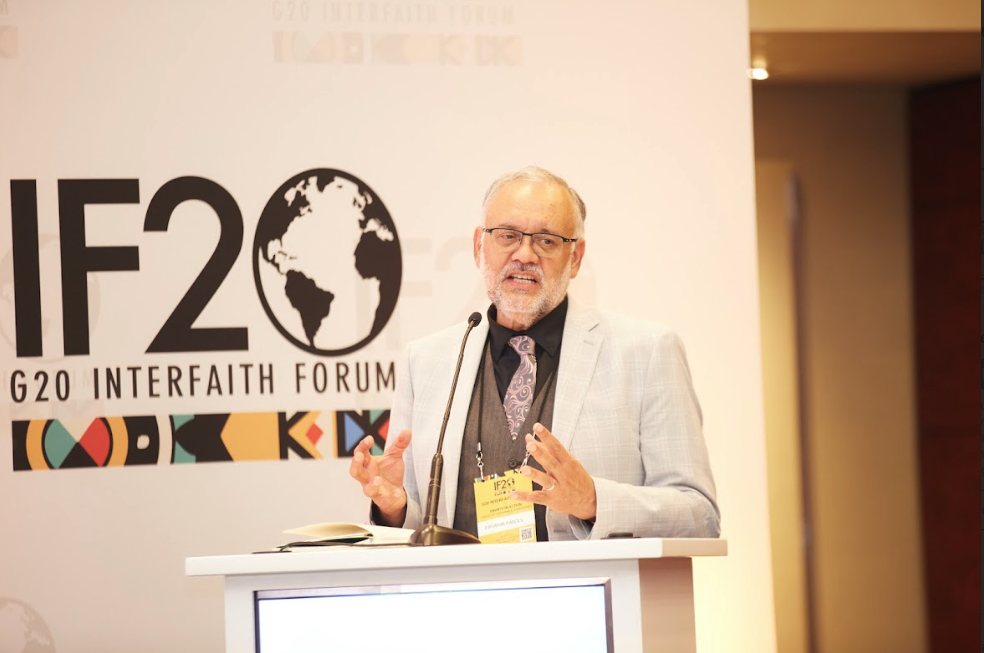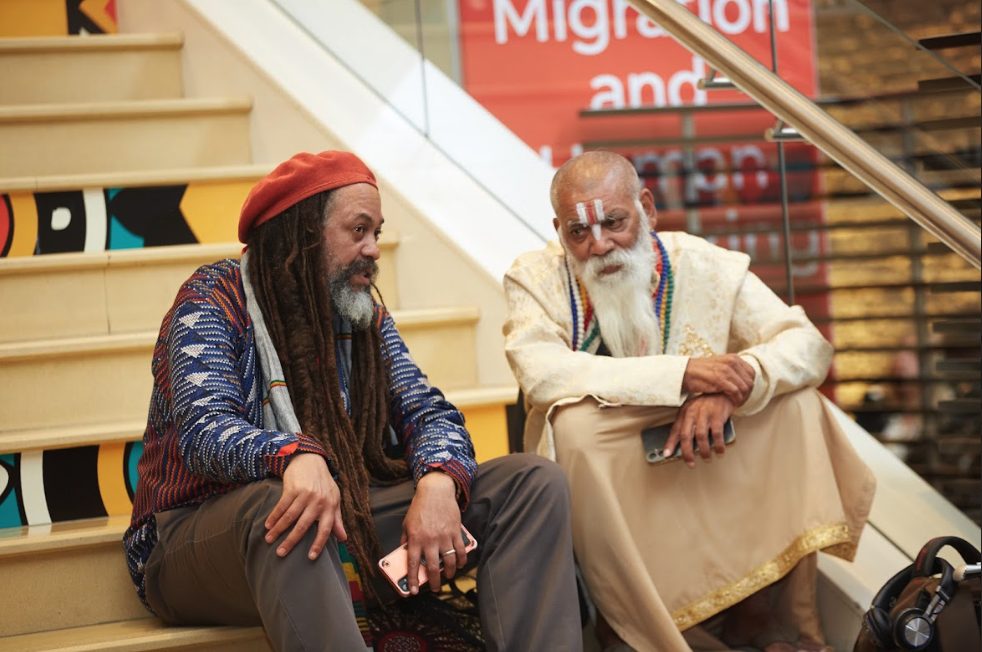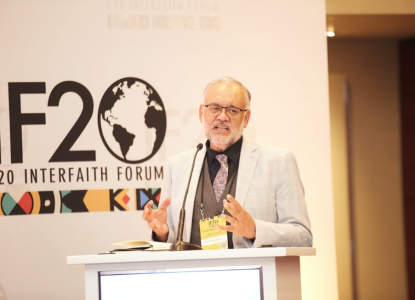By Ambassador Ebrahim Rasool
– – –
Shortly before the second plenary session of the G20 Interfaith Forum in Cape Town, August 10-14, 2025, Ambassador Ebrahim Rasool provided a spotlight on “Courage Amidst Conflict & Vulnerability: Faith Rising to the Occasion.” His comments can be read below or viewed here.
Thank you, very much, and Good Afternoon, Assalamu Alaikum, Molweni, and all the other languages that are represented here! As a resident of Cape Town, to all my friends who have come from all over the globe, most particularly those we intersected with in the United States and who I met last year in Brazil at the G20 Interfaith Forum 2024: Welcome to Cape Town. I hope you’re going to find it everything that we had promised it to be.
Last year in Brazil at the IF20, I spoke about how faith communities must move from the moral clarity that religions often have, to finding the moral courage to do what that clarity demands once it pierces our conscience. The question is: what is courage and how do we manifest it in a world of conflict and vulnerability?

Emmanuel Kant, for me, understood courage best when, for example, he posits that the opposite of short sightedness is not perfect sight; the opposite of short sightedness is long sightedness, and that perfect sight is the perfect middle between the two.
In that same vein, courage is not the opposite of cowardice; recklessness is the opposite of cowardice. Courage is the perfect middle, because it has the ability to call out the cowards and bring them to action in a time of danger, and at the same time to have the courage to diminish excessiveness, diminish extremes, diminish recklessness, and bring those who peddle them to the middle. So, our courage means our ability to speak to both sides of the equation: to those who are morally cowards and ultra-cautious in the face of power where they should be standing up, and those who are morally reckless, excessive, and extreme when they should be measured and balanced.
Therefore, what we need as moral courage is the ability to speak to both sides of the equation.
That’s the spirit in which we have invited you to Cape Town, South Africa, with the thematic coherence of Ubuntu. You have heard all the definitions: I am because you are; we are people through other people; we are interdependent; we have a common humanity!
Ubuntu, in a very real way, is the soft power that South Africa presents in a hard world. It reflects the idea that human beings are interdependent despite the differences of race, despite their differences of language, despite the differences of religion, and every other difference; that we are interdependent and that therefore our humanity is what defines us, and our humanity is what drives us, and binds us together.
But Ubuntu has a hard edge, because it is founded also in the words also of the scripture, that says we are each other’s keepers. We have a responsibility to each other, we are accountable to each other, and we call each other to account. And that is the art of speaking the truth, to both sides of the equation.
Therefore, when we have our demons as Muslims (like those who appropriate our faith for extremism), on the one side of the equation, we need to call them out. And when you have your demons on either side of that equation, you have the accountability under Ubuntu to call them out, so that the world finds its equilibrium, and religion stands as a religion of that equilibrium, not the religion of an ideology.
Inspired by the Quran, in the dark days of Apartheid, that moral clarity declared that ‘Allah, God, has shown us the two ways, but that people are not making haste on the path that is steep and difficult. How can God describe what this difficult path is?’
And in describing the difficult path, it is not the path of praying, of fasting only. It is the path of freeing in the days of slavery, feeding in the days of hunger, embracing the stranger, looking after those who have been de-parented. Then you are those who believe. Belief is contingent on those humane acts. Then you are of those who do good, as good is defined by that courage. Then you are people of truth, that you stand up for truth irrespective of its discomfort to you; then you are people of compassion. Those are the things that we need to be in the days of hunger, in the days of marginalization.
What we need to be able to do, in these days, is to define what interfaith is. For some, interfaith is an opportunity for competitive faith: how good is your religion versus mine? How do I get adherents from you or prevent you from you getting adherents from me? For some faith, interfaith is comparative: we pray like this, and you pray like that, and there’s merit in that. For others, faith is cooperative: let’s work together on this campaign, shoulder to shoulder, etc. All of that is good.
But when faith itself is staring down the barrel [of a gun], then faith needs to be collaborative. When faith and religion is both the doctor and the patient, then it admits its own vulnerability as a phenomenon in this world. And it says, let’s hold hands together, because we are fighting an existential battle for faith and religion itself, as we fight the issues on both sides of the equation.

And so, when we embark on that collaborative work, we begin to see the obvious vertical divides between Muslim, Christian, Hindu, Jew, Jain, Sikh, Buddhist, non-believer, etc. Those vertical divides are very easy to see, but within those vertical divides, as we found out in the anti-Apartheid struggle, there are also horizontal divides which bring some of us closer to each other. Because some of us, across all our religions, are so orthodox that we find ourselves in a state of inertia. Some of us are so extreme that we find ourselves as a nihilistic phenomenon in the world, that we are destructive in the name of our religion. Some have more in common with their mirror image in the other than they have with their co-religionists. And some of us are the middle ground, the people who find meaning in doing the work of God amongst the people of God, demanded by today’s context of conflict and vulnerability.
And therefore, to end. We spoke last year about predictions for the future, and those predictions have become matters of urgency today. When last year we spoke about a looming populism, that populism predicted last year in Brazil has become the mainstreamed extremism of today, manifesting itself across the world. When we spoke about last year how differences are trying to coexist, the differences of last year have become the divisions of this year. When we spoke last year about the looming tensions that are emerging, the tensions of last year have become full blown conflicts this year. When we spoke about the vulnerable last year, the vulnerable of last year have become the victims of massacres and starvation. We spoke last year about the fears that people have, and those fears of last year have become the intolerances of this year. When we spoke last year about those migrants looking for peace and for well-being in the world, the migrants of last year have become the deported, the outcast, and the discarded of this year.
We spoke last year about the idea of populism. This year that populism has its fingers on the buttons that can defund health programs, on the buttons this year that can fund wars. Populism this year has an impunity that can do whatever it wants with permission from the world.
Religion must act in the name of faith, drawing from its deep and profound spiritual resources. Religion cannot appeal to the powers that be because they themselves are often compromised by their interests in a world where trade wars become pernicious, manifestations of the will of a person or a government. The ears that are waiting for us are the ears of the people of the world. We have seen the campuses rise against the capitals. We have seen the streets become restless against their palaces. We have seen the ordinary people begin to speak. And so while we speak to the powerful, we ignore those who really want our guidance, who want to believe again, who want to understand the manifestation of God. And the closest they will come is to find it in the churches, the mosques, the synagogues, the temples from which we preach. They will reclaim their faith as a force for good and manifest it in good works. And if we compromise because we need to be good with our governments, and we need to escape their surveillance, then we have compromised on the very truth that the world needs.
And if we can’t do it, who will?
Thank you very, very much.
– – –
Ambassador Ebrahim Rasool recently completed a term of duty as South Africa’s Ambassador to the United States of America, an appointment that was the culmination of a distinguished record of Public Service in South Africa. Previously he served as a Member of Parliament in South Africa’s National Assembly, Special Advisor to the State President and has built up extensive experience in various Departments like Health, Welfare, Finance and Economic Development in the capacity of Provincial Minister. He worked in the Alwaleed Bin Talal Center for Muslim-Christian Understanding, advancing an alternative paradigm to the inertia of Orthodoxies in the face of Extremisms. He is the founder of the World for All Foundation that endeavors to create a world of coexistence and that is safe for difference.


